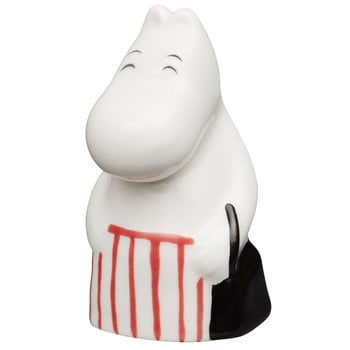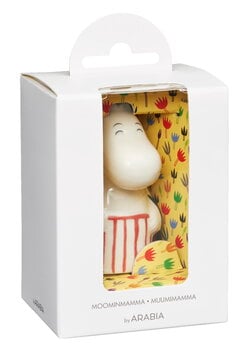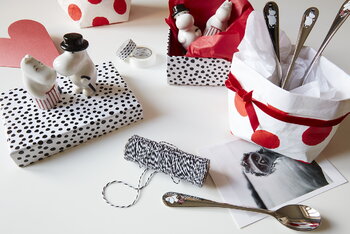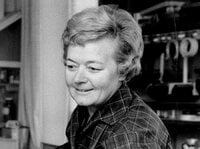Arabia’s Moominmamma mini figurine is part of the ceramic collection that depicts Tove Jansson’s beloved Moomin characters. The Finnish artist Tuulikki Pietilä designed the ceramic figurines in the 1990s, and Arabia re-launched them in 2017. Moomin mini figurines are handmade collectables that come in pretty gift boxes.
Moomin mini figurine, Moominmamma
Moomin Arabia
Description
Arabia’s Moominmamma mini figurine is part of the ceramic collection that depicts Tove Jansson’s beloved Moomin characters. The Finnish artist Tuulikki Pietilä designed the ceramic figurines in the 1990s, and Arabia re-launched them in 2017. Moomin mini figurines are handmade collectables that come in pretty gift boxes.
Product details (4)
- Material
- Ceramic
- Width
- 7.5 cm
- Depth
- 6 cm
- Height
- 8 cm
- Product ID
Designer
Tuulikki Pietilä (1917–2009) was a Finnish artist and one of the most influential names of Finnish graphic arts of the 20th century. From 1955 Pietilä’s life partner was the Finnish artist and author Tove Jansson, who is best known for her Moomin books. Together they collaborated on many art projects, and the Moomin characters had a significant role in Pietilä's work as an artist.
Pietilä studied art in several different schools and countries, including drawing schools in Helsinki and Turku, Stockholm’s University College of Arts, Crafts and Design and the Fernand Léger Art Academy in Paris. Pietilä had an experimental attitude towards different techniques and styles, and she also worked as a teacher in the Academy of Fine Arts, Helsinki. In 1963 Pietilä was awarded the Pro Finlandia medal, and in 1982 she received the title of professor. Pietilä’s oeuvre of over 1400 works has been bequeathed to Helsinki’s Ateneum Art Museum.
View all productsReviews (2)
5
Based on 2 reviews
-
D
David V
Cierna nad Tisou, Slovakia
321 days ago
-
A
Anonym
Diessen am Ammersee, Germany
378 days ago
Sustainability
The Product Sustainability Framework, our criteria of sustainable design, helps you find the most sustainable products in our selection. Read below which sustainability criteria this product has met.
Working conditions & labour 0/9
-
Equal opportunities for all employees
-
Commitment to UN Global Compact, fair compensation for all employees
-
Corporate responsibility requirements defined and communicated for suppliers
-
Systematic work for improved inclusion and well-being in the workplace
-
Transparent supply chain
-
Suppliers' compliance to a code of conduct ensured
-
Direct suppliers audited and certified
-
Compliance to the UN Guiding Principles on Business and Human Rights ensured in the supply chain
-
Support for community involvement in the supply chain
Eco-friendly production 2/9
-
No direct environmental emissions or waste (excl. GHGs) from production
-
Material-efficient and ecological packaging
-
Fair and resource-wise water-use in production
-
No incineration or landfilling of returned items
-
No use of endangered species as materials
-
The sustainability of direct suppliers' production is addressed and monitored
-
Production and material sourcing that respect biodiversity, animal rights, and natural ecosystems
-
Positive impact on nature’s well-being through operations that regenerate natural ecosystems
-
No potentially harmful chemicals used in own production
Climate impact 2/8
-
Product's carbon impact identified and commitment to reduction
-
Guidance on energy- and eco-efficient use of the product
-
Company's direct greenhouse gas emissions identified and commitment to reduction
-
Contribution to climate initiatives beyond the brand’s direct operations
-
Low-carbon or compensated transportation
-
Carbon footprint of the product calculated and goals set to reduce it
-
100 % renewable energy in own production and operations
-
Carbon neutral or carbon negative product
Sustainable materials 4/6
-
Sustainable and long-lasting material choices
-
No harmful or hazardous substances
-
Responsible raw material sourcing and production
-
Ecological materials: natural, biodegradable, recyclable or recycled contents
-
Materials suited for circularity: monomaterials, recyclable finishings, renewable or recycled contents etc.
-
Outstanding materials in terms of innovativeness, responsibility, sustainability and circularity: local production or sourcing, 100 % recycled content, C2C-certification etc.
Circular design 4/5
-
High aesthetic quality promoting long-term use of the product
-
Technically durable product design and material choices
-
Design for enduring life-long quality
-
Design and support for product maintenance, repair and upgradability
-
Innovative circular design solutions: circular service system, resale platform, remanufacturing, collection of used products, etc.











